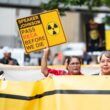Reprocessing: Only where appropriate
By Yun Zhou, April 17, 2014
The presidents of China and France recently brought renewed attention to the issue of nuclear waste management when they issued a joint statement discussing their nations' plans to establish a commercial reprocessing plant. But waste management has not come under discussion so far in this roundtable, which has focused mainly on public attitudes toward nuclear power. Waste management should not be ignored, however—it is a critical element of any nation's capacity to operate a nuclear sector, and indeed a 2003 MIT study identified waste management as one of four critical challenges (along with cost, safety, and proliferation) that must be overcome if a large expansion of nuclear energy is to occur.
When a nation first considers adopting nuclear power, its nuclear development plan is likely to be modest. Management of spent fuel and other nuclear waste might not seem a pressing concern at that point. But in reality, any nation that establishes a nuclear power sector—particularly a developing nation with limited resources—must devote careful thought to the policies that will govern long-term management of waste.
To date, no country in the world has implemented a permanent solution for managing nuclear waste in either of its two main forms: the spent fuel that emerges directly from reactor cores and the high-level radioactive waste that results when spent fuel is reprocessed. Establishing a permanent repository for either spent fuel or high-level waste requires vast geological resources and often encounters public resistance. Reprocessing spent fuel allows a portion of the fuel to be reused, which reduces the overall volume of waste—but it presents its own challenges.
Establishing a long-term policy of reprocessing spent fuel is natural enough for a large developing nation such as China—a country with tremendous projected energy demand, a huge commitment to nuclear energy, and a strong infrastructure in science and technology. But reprocessing is a complex and uneconomical process compared to interim storage of spent fuel. It requires huge financial inputs, a fairly strong science and technology infrastructure, a consistent national energy policy, and cooperation with other countries on advanced nuclear technology. So smaller developing countries might choose to forego reprocessing. For that matter, nations that don't intend to establish large-scale nuclear energy programs and that lack the geological resources to establish a permanent repository might choose to depend on interim, rather than permanent, storage of spent fuel.
Ultimate solutions to the problem of nuclear waste may one day be identified. Nations able to do so should carry out research and development that may hasten that day. For now, though, many emerging countries must be satisfied with dry storage of spent fuel, on-site or off-site, as an interim solution to the problem of nuclear waste.
Topics: Nuclear Energy
Share: [addthis tool="addthis_inline_share_toolbox"]














